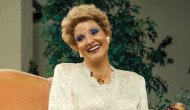
Conrad Nagel, the handsome matinee idol and co-founder of the Academy Motion Picture Arts & Sciences was the host of the fifth annual Academy Awards on Nov. 18, 1932. The evening marked Nagel’s second stint at Oscars host; the then-academy prez had hosted the festivities two years earlier. He turned on the charm in his sophomore outing at the glamorous banquet at the Fiesta Room of the Ambassador Hotel honoring films released between Aug. 1, 1931 and July 31, 1932. (Nagel would later co-host the first televised Oscars with Bob Hope in 1953.)
Eight films vied for Best Picture: John Ford’s medical drama “Arrowsmith”; Frank Borzage’s marital drama “Bad Girl”; Mervyn LeRoy’s examination of tabloid journalism “Five Star Final,” Edmund Goulding’s stylish drama “Grand Hotel”; Ernst Lubitsch’s pre-Code musical comedies “One Hour with You” and “The Smiling Lieutenant”; and Josef von Sternberg’s luscious pre-Code melodrama “Shanghai Express,” starring his muse Marlene Dietrich.
“Grand Hotel,” which received no other nominations, won. The big-budget melodrama based on Vicki Baum’s novel started the all-star cast trend which still exists today (just look at the line-up in this year’s nominee “Don’t Look Up.” “Grand Hotel” was populated with some of the studio’s biggest stars including Greta “I vant to be alone” Garbo, John and Lionel Barrymore, Joan Crawford, Wallace Beery and Lewis Stone.
Not everyone was thrilled with “Grand Hotel” as the top choice with the Los Angeles Times observing that “‘Grand Hotel’ filled, it appeared, the requirements of bigness.” In 1945, MGM remade the film as “Weekend at the Waldorf” and a musical version opened on Broadway in 1989 receiving 12 Tony nominations and winning five.
For the first and only time in academy history, Best Actor was a tie between Fredric March who played both roles in the adaptation of the Robert Louis Stevenson classic “Dr. Jekyll and Mr. Hyde” and Wallace Beery as an alcoholic washed-up prize fighter with a young son in the four-hankie weepie “The Champ.” Both actors had also recently adopted children causing March to quip that evening: “Under the circumstances, it seems a little odd that Wally and I were both given awards for the best male performances of the year”.
The two actors didn’t really tie. The academy rules stated that if any nominee came within three votes of the top contender on the final ballot, they would also win; Beery came within one vote. The academy later changed the rules stating that it had to be a literal tie to win. Thirty-seven years later, Barbra Streisand (“Funny Girl”) and Katharine Hepburn (“The Lion in Winter”) became the only women to tie for best actress.)
The Oscars were also a family affair for married Broadway superstars Alfred Lunt and Lynn Fontanne. They were nominated for best actor and actress for their only feature film together “The Guardsman.” (This year, married Oscar-winners Penelope Cruz and Javier Bardem are in contention for “Parallel Mothers” and “Being the Ricardos” respectively. And engaged couple Kirsten Dunst and Jesse Plemons are nominated for their featured roles in “The Power of the Dog.”)
Fontanne lost to another Broadway superstar Helen Hayes, who played a fallen woman who has a child out-of-wedlock in the teariest of tearjerkers “The Sin of Madelon Claudet.” According to “Inside Oscar,” she noted “the thrill of winning equaled her excitement when she gave birth to her daughter: ‘The only time in my life when I really felt great or superb, all I could think to say was ‘Gosh, isn’t she red.’ I hope I do better, the second time, but I doubt it.”
Best Director (Borzage) and adaptation (Edwin Burke) went to “Bad Girl.” Ironically, the film isn’t about a bad girl. Frances Marion, one of the most respected female writers of the era, earned her second Oscar for original story for “The Champ.” She won previously two years earlier for the prison picture “The Big House.” She would receive one more nomination for original story for 1933’s “The Prizefighter and the Lady”; she lost then to Robert Lord for “One Way Passage.”
Lee Garmes won the Oscar for cinematography for “Shanghai Express” and Gordon Wiles received the art direction statuette for “Transatlantic.”
The fifth annual Oscars added the short subject category handing out awards for animation, comedy and novelty. Hal Roach’s classic comedy short “The Music Box” starring Laurel and Hardy won the best comedy short and Mack Sennett’s documentary short, “Wrestling Swordfish” won for novelty.
It was a big evening for 30-year-old Walt Disney. Not only did he make an animated short for the banquet — “Parade of Award Nominees” — he won his first Oscar for the Silly Symphony “Flower and Trees,” the first three-strip Technicolor film to be released commercially. The Technicolor Motion Picture Corp. won a Classic II Scientific or Technical Award for its color cartoon process.
Disney had also been nominated in the category for the Mickey Mouse short “Mickey’s Orphans.” He was given a special award during the ceremony for the creation of Mickey Mouse. Disney would go on to make Oscar history winning a whopping 26 Oscars during his career, the most by a single person.







